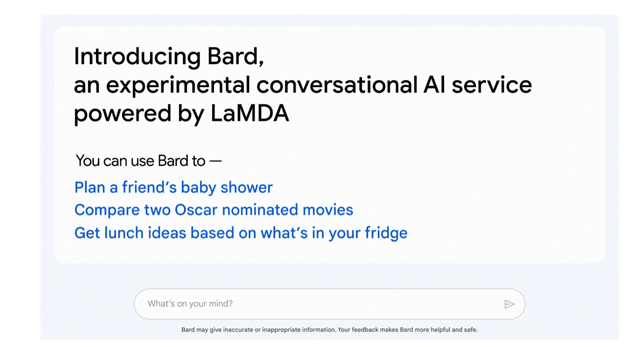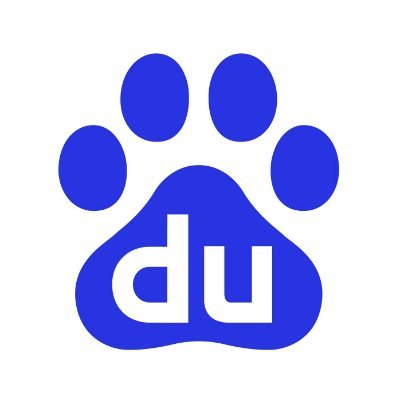
Beyond OpenAI: Who else is working on generative AI models?


The massive hype around OpenAI’s smart chatbot ChatGPT, right from its launch last year has prompted other companies to come up with their own versions. In the last few months, both big tech companies like Google, and Meta and smaller AI startups have introduced their rivals to ChatGPT. Here we look at some of the more prominent ones.
Google’s Bard

Source: Google Blog
Last month, Google launched its experimental conversational AI chatbot Bard. In a blog announcing Bard, Google chief Sundar Pichai said that the chatbot aims to combine the ‘breadth of the world’s knowledge with the power, intelligence and creativity of our large language models’. Bard uses information from the web to produce high-quality responses, Pichai added.

It is built on Language Model for Dialogue Applications (or LaMDA) which was introduced by Google two years back. Google announced that Bard will be using a lightweight model of LaMDA, a smaller model that uses lesser computing resources for the initial phase.
The launch of Bard was the centre of attention for more than one reason. Google tweeted a demo of the model’s response to a question on the James Webb telescope. As pointed out by many users, Bard gave an incorrect response. This led to Google parent Alphabet losing $100 billion in value.
Meta’s LLaMA

In the past, Meta has released models similar to smart chatbot ChatGPT. For instance, the company introduced Galactica, a language model that could offer summaries, solve math problems, and answer questions, among other tasks. However, the launch was not a big success as the tool was found to produce incorrect or biased responses during the public beta in November 2022.
Blenderbot 3, introduced in August 2022, also ended up producing offensive and inaccurate responses.
Baidu’s Ernie


One of China’s biggest search and artificial intelligence firms Baidu will be making its ‘ChatGPT-inspired’ bot Ernie available to the public this month. As informed by CEO Robin Li in February during a conference call with analysts, the company would first integrate Ernie into its search engine, followed by making it available for its intelligent driving unit and other business partners.
As per Baidu, Ernie bot has been under work since 2019 and has been scaled up to over 100 billion parameters now. As of now, the company favours embedding it as a feature with company products over offering it as a standalone feature.

One of the salient features of the chatbot is that it is localised to understand the Chinese language and culture, making it lucrative especially for the Chinese market.
Alibaba


Another major Chinese company Alibaba has also announced that it will be soon introducing a ChatGPT rival. In a statement to CNBC, Alibaba’s spokesperson said in February that it is working on introducing its own generative AI chatbot.
While the company did not give a definitive timeline for the launch of the chatbot, the spokesperson said that it is in the testing phase. According to Alibaba, the company has been working on large language models and generative AI since the formation of the Academy for Discovery, Adventure, Momentum, and Outlook (DAMO) in 2017. DAMO is Alibaba’s research arm.
DeepMind’s Sparrow


In an interview with TIME magazine in January this year, AI research firm DeepMind’s CEO Demis Hassabis said that a ChatGPT-like chatbot called Sparrow would be beta tested this year. Notably, DeepMind first revealed Sparrow in a paper in September 2022. It was then described as an ‘information-seeking dialogue agent’, and claimed to be more accurate and harmless than its competitors.
In a blog announcing Sparrow, DeepMind said that it was a proof of concept designed to train other dialogue agents to be safer and more useful, and ultimately ‘help build safer and more useful artificial general intelligence (AGI)’.
Other important mentions
Apart from the chatbots listed about, several other companies have also launched their ChatGPT rival tools. AI firm Anthropic, which recently received a $300 million investment from Google, has launched Claude. The model is trained with limited natural language instructions that it uses to revise its future responses. Unlike ChatGPT, it does not incorporate human feedback.

Microsoft launched the Prometheus model on February 7. It is a proprietary AI model that integrates ChatGPT-like functionality into its search engine Bing. Unlike ChatGPT’s underlying model GPT-3.5 which is trained only on data till the year 2021, Prometheus combines it with latest information from Bing’s backend to give more relevant output.
Other tools include You.com’s YouChat and Neeva’s generative AI search engine Neeva AI.
